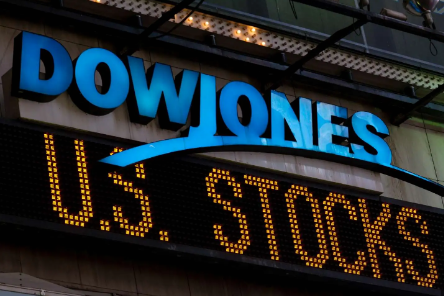
Date Issued – 16th August 2024
Courtesy of the Research Department at Balfour Capital Group
Dow Jumps Over 550 Points Following Retail Sales Data: Greed Index Remains In ‘Fear’ Zone
On Thursday, the U.S. stock market saw a significant rally, with the Dow Jones Industrial Average jumping over 550 points, closing at 40,563.06. The S&P 500 and Nasdaq Composite also experienced strong gains, rising by 1.61% and 2.34%, respectively. This positive movement in the market was fueled by encouraging economic data and strong corporate earnings reports.
Key economic indicators contributed to the market’s positive sentiment. U.S. retail sales showed a robust 1% month-over-month increase in July, surpassing market expectations of a 0.3% gain and rebounding from a revised 0.2% decline in June. Additionally, initial jobless claims dropped by 7,000 to 227,000 for the week ending August 10, below the anticipated 235,000. The NY Empire State Manufacturing Index also rose to -4.7 in August, marking its highest level in six months.
In the corporate sector, Walmart reported strong second-quarter results and raised its full-year guidance, while Cisco Systems saw its shares rise by 6.8% following better-than-expected earnings. Despite the overall market rally, Alibaba Group reported disappointing sales for its fiscal first quarter.
The CNN Money Fear & Greed Index, which measures market sentiment, showed some improvement but remained in the “Fear” zone with a reading of 32.9, up from 27.6. This index, which ranges from 0 to 100, reflects the balance of fear and greed in the market, with higher fear typically exerting downward pressure on stock prices and higher greed driving them up.
Most sectors within the S&P 500 saw gains, particularly consumer discretionary, information technology, and materials, while real estate and utilities sectors underperformed. Investors are now looking forward to earnings results from companies like Madison Square Garden Entertainment, CI&T Inc., and Flowers Foods.
Replacing China in Copper Supply Chain is ‘Unfeasible,’ Warns WoodMac, as the West Seeks Shift
Western countries’ attempts to reduce reliance on China in the copper supply chain face significant challenges, as outlined in a report by Wood Mackenzie. China currently dominates several key stages of the copper supply chain, particularly in smelting, refining, and fabricating, which are crucial for emerging technologies like renewable energy, electric vehicles, and energy storage.
As countries like the U.S., Canada, Australia, and European nations seek to diversify away from Chinese dominance, they risk delaying the energy transition and increasing costs. Wood Mackenzie warns that completely replacing China in the copper supply chain is “unfeasible” due to the scale of China’s involvement. The report indicates that replicating China’s capacity would require “hundreds of billions of dollars” in new infrastructure, leading to inefficiencies and significantly higher prices for finished goods.
Currently, existing mines and those under construction are expected to meet only 80% of global copper needs by 2030, suggesting a looming shortage. While the Americas and Africa dominate initial mining, China’s strength lies in downstream processing. Since 2000, China has contributed to 75% of the world’s smelter capacity growth, and it now holds about 50% of the world’s copper fabrication capacity.
Efforts in the West, such as the U.S.’s Inflation Reduction Act, aim to boost critical mineral investments. However, these initiatives face challenges due to low utilization rates, high operating costs, and stringent environmental regulations. The report suggests that pragmatism and compromise, including potentially easing global trade restrictions, will be necessary to achieve net-zero goals without excessive costs. This indicates that while diversification away from China is a priority, a complete decoupling may not be practical or beneficial in the context of global copper supply.
Bitcoin Price Today: Steady at $58k, Lags Broader Market Recovery
Bitcoin is currently steady at around $58,238, showing only a minor weekly gain of 1% and remaining within its usual trading range of $50,000 to $60,000. Despite improved sentiment in broader markets, particularly in stocks, Bitcoin and other cryptocurrencies have lagged behind.
The crypto market’s underperformance is due to several factors, including concerns over potential Bitcoin sales by Mt. Gox as it prepares to return assets to clients after a 2014 hack, and an uncertain regulatory environment. The dollar’s brief rebound on Thursday also added pressure. Additionally, traders have been withdrawing large amounts of USDT from exchanges, signaling caution, while Bitcoin ETFs continue to experience outflows.
Altcoins like Ether have also been struggling, with Ether down 1.4% to $2,600.94 and poised for a fourth consecutive week of losses. Other major altcoins like XRP, ADA, and SOL have remained mostly flat, with DOGE down 0.9%. Overall, the crypto market appears to be cautious, lagging behind the more robust recovery seen in global stock markets.
Bayer Wins Victory in US Legal Battle Against Roundup Cancer Claims
Bayer secured a significant legal victory in its ongoing battle over claims that its Roundup weed killer causes cancer. On Thursday, the 3rd U.S. Circuit Court of Appeals in Philadelphia ruled in favor of Bayer, stating that federal law shields the company from a lawsuit brought by David Schaffner, a Pennsylvania landscaper who alleged that Roundup caused his non-Hodgkin’s lymphoma. The court’s decision emphasized that the Federal Insecticide, Fungicide, and Rodenticide Act mandates uniformity in pesticide labeling across the U.S., thereby preventing Pennsylvania from requiring a cancer warning on Roundup’s label.
This ruling could have broad implications for Bayer’s liability in similar cases, as it conflicts with decisions made by federal appeals courts in San Francisco and Atlanta. The disagreement among courts may lead the U.S. Supreme Court to step in and potentially provide a definitive ruling on the matter, which could reduce Bayer’s overall liabilities. Bayer, which acquired Monsanto—the original manufacturer of Roundup—in 2018 for $63 billion, has faced substantial litigation over the product. Despite settling a large portion of these cases for $10.9 billion in 2020, the company still faces around 58,000 claims. The ongoing legal battles have significantly impacted Bayer’s share price, which has dropped by more than 73% since the Monsanto acquisition.
Bayer expressed satisfaction with the ruling, reiterating its stance that Roundup and its active ingredient, glyphosate, are safe. The company has won 14 of the 23 Roundup trials to date, although some losses have resulted in hefty damages. The Schaffners had settled with Bayer in 2022, contingent on the outcome of the preemption argument, which the court ultimately decided in Bayer’s favor. The case highlights the complex legal landscape surrounding product liability and federal preemption, particularly in cases involving widely used chemicals like glyphosate.
Tesla Has Lost Share in All Geographies, in Both xEVs and EVs
Tesla has been facing a significant decline in its market share across various segments and regions, according to analysts from Bernstein. The company’s share of the global electric vehicle (EV) and xEV markets has been steadily decreasing since 2019. In the first half of 2024, Tesla’s share of the global xEV market dropped to 12%, down from 17.5% in 2019. Similarly, its share of the battery electric vehicle (BEV) market fell from 28% in 2019 to 20% in 2024.
The decline is most pronounced in North America, where Tesla’s BEV market share plummeted from 77% in 2019 to 48% in the first half of 2024. Analysts attribute this drop to increasing competition and the lack of new, lower-priced offerings from Tesla, which they believe won’t be addressed until 2026 or 2027. Bernstein also highlights challenges in predicting Tesla’s short-term performance, especially with the upcoming Robotaxi announcement in October, which they suspect may be more of a visionary presentation rather than a concrete product release. They maintain an “Underperform” rating on Tesla’s stock, with a $120 price target, citing concerns about the company’s valuation and longer-term growth prospects.
The report also notes a slowdown in the broader EV market, with BEV sales growth decelerating to just 9% year-over-year in the first half of 2024, while Plug-in Hybrid Electric Vehicle (PHEV) sales surged by 49% during the same period. This slower growth, coupled with falling average selling prices, further complicates Tesla’s position in the increasingly competitive EV market.

